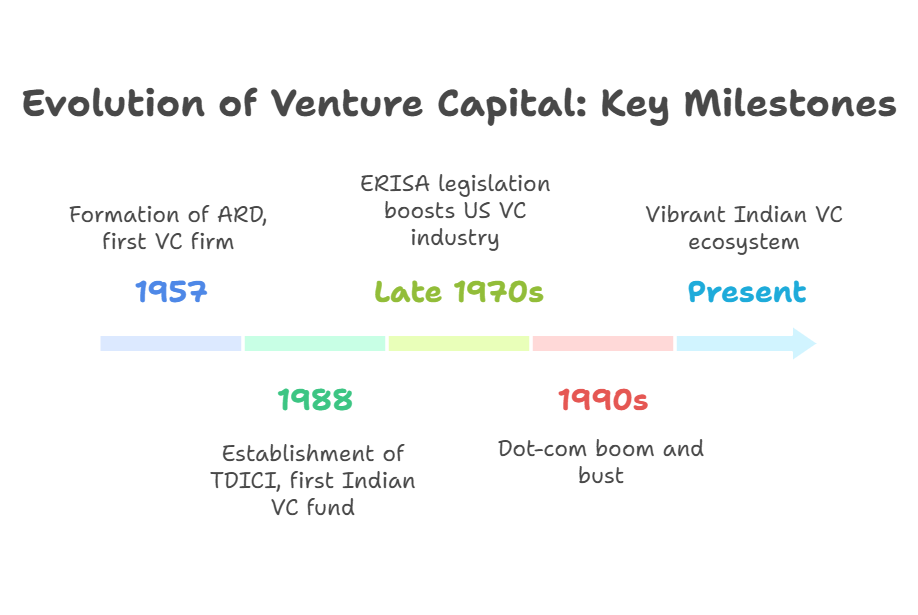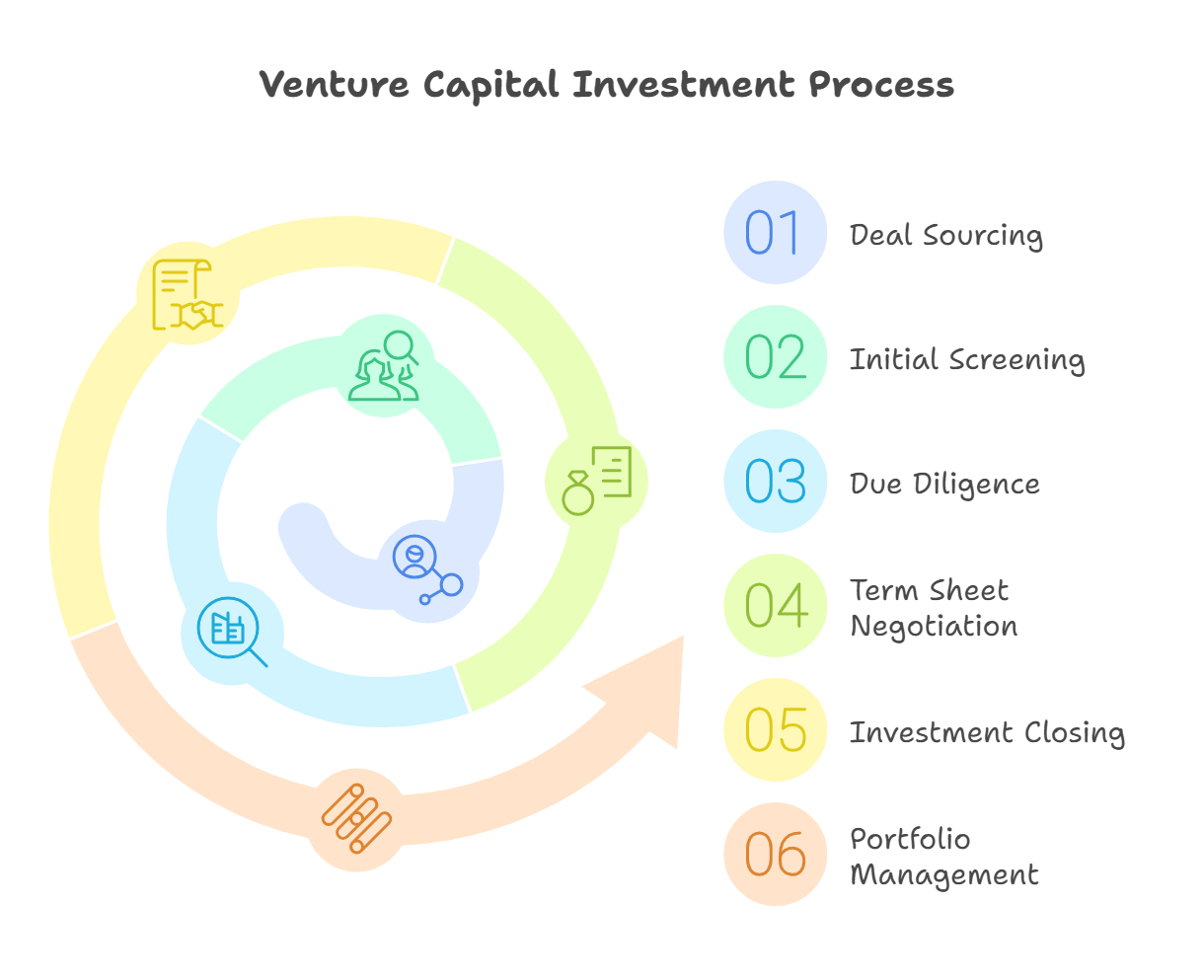Venture Capital
Venture Capital (VC) is a type of private equity financing that focuses on funding early-stage, high-potential growth companies. It's a significant source of capital for startups and emerging businesses that lack access to traditional financing options like bank loans or public markets. Let's explore this topic in detail:
Concept of Venture Capital
- Definition: VC is an investment in a private company, typically a startup or early-stage business, in exchange for equity (a percentage of ownership) in that company.
- High Risk, High Reward: VC is inherently risky. Most startups fail, but the potential return on a successful investment can be exceptionally high (10x, 20x, or even more).
- More than Just Money: VC firms usually provide more than just capital. They often offer valuable expertise, mentorship, networking opportunities, and strategic guidance to help their portfolio companies succeed.
- Patient Capital: VC investments are typically long-term (5-10 years or more). Investors are willing to wait for the company to grow and generate a return.
History and Evolution of VC
-
Early Stages (US): VC emerged in the US after World War II as a way to fund technological innovations. Key milestones include:
- 1957: Formation of the first VC firm, ARD (American Research and Development Corporation).
- 1960s-70s: Focus on electronics, medical, and data processing technologies.
- Late 1970s: Landmark legislation (ERISA) enabled pension funds to invest in VC, boosting the industry.
-
Boom and Bust Cycles: VC has experienced several cycles of booms and busts:
- 1980s: Growth driven by personal computers and biotechnology.
- 1990s: Dot-com boom, overinvestment in internet startups, followed by a crash.
- 2000s: Rise of social media, mobile technologies, and clean energy.
-
Indian Context: VC in India has followed a similar trajectory, with a few distinct features:
- 1988: Establishment of the first Indian VC fund, Technology Development and Information Company of India (TDICI).
- Early 2000s: Growth of the Indian IT services and outsourcing industry attracted VC investment.
- Mid-2000s: Increased focus on consumer internet, e-commerce, and mobile startups.
- Present: A vibrant VC ecosystem with domestic and international investors, targeting sectors like fintech, e-commerce, healthcare, and education.

The Venture Investment Process
VC firms follow a structured process for evaluating and investing in companies:
- Deal Sourcing: Finding potential investment opportunities through various channels (e.g., networking, referrals, industry events, startup competitions).
- Initial Screening: Reviewing business plans and pitch decks to identify promising candidates.
-
Due Diligence: Conducting in-depth research on the company, including:
- Market analysis
- Competitive landscape
- Financial projections
- Team assessment
- Legal and regulatory compliance
-
Term Sheet Negotiation: If due diligence is satisfactory, negotiating the terms of the investment, including:
- Valuation of the company
- Amount of investment
- Equity stake
- Board representation
- Control rights
- Liquidation preferences
- Investment Closing: Finalizing the legal agreements and transferring the funds to the company.
- Portfolio Management: Providing ongoing support and guidance to the portfolio company.
- Exit Strategy: Planning for how the VC firm will eventually exit the investment and realize a return, typically through:
Various Steps in Venture Financing (Funding Rounds)
Startups typically raise capital in a series of funding rounds as they progress. Each round has a different purpose and valuation:
| Funding Round | Purpose | Investors |
|---|---|---|
| Pre-Seed | Initial concept development, market research, building a prototype | Founders, friends, family |
| Seed | Initial product launch, early customer acquisition, building a team | Angel investors, early-stage VC firms |
| Series A | Scaling operations, expanding sales and marketing, achieving product/market fit | VC firms, growth equity firms |
| Series B | Entering new markets, further scaling, building out infrastructure | Later-stage VC firms, private equity firms |
| Series C+ | Continued growth, acquisitions, preparing for IPO | Private equity firms, hedge funds, institutional investors |
Various types of venture financing
Venture Capitalists can supply support through the following methods;
- Equity Participation: Venture Capitalists gain a portion of the company's equity
- Conditional Loan: Royalty and Interest payments are the cost of financing.
- Income Notes: Between conditional loan and conventional loans
- Participating Debentures: Depends on what's operating above minimum level
Incubation Financing
- What: A more specialized form of early-stage funding provided to companies participating in incubation or acceleration programs.
- Incubators and Accelerators: These programs offer startups resources like office space, mentorship, access to investors, and training in exchange for equity.
- Purpose: Incubation financing helps startups develop their business model, refine their product, and achieve key milestones.
Key Takeaways:
- VC is a critical source of funding for innovative startups and emerging technologies.
- It involves a high-risk, high-reward investment strategy.
- VC firms provide capital, expertise, and networks to their portfolio companies.
- The venture investment process is structured and rigorous.
- Startups raise capital in a series of funding rounds as they grow.
- Incubation financing supports startups within incubation/acceleration programs.


No Comments